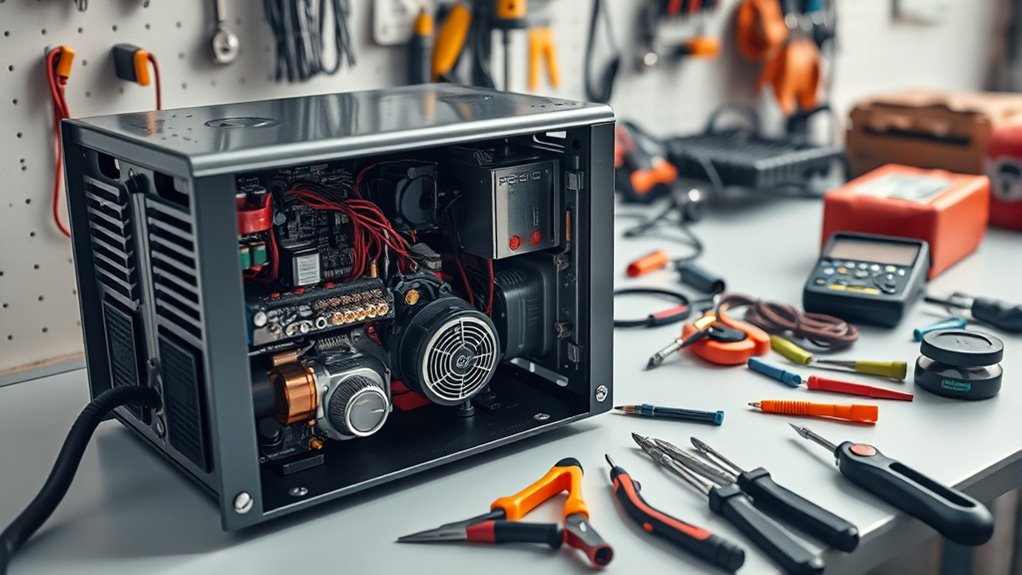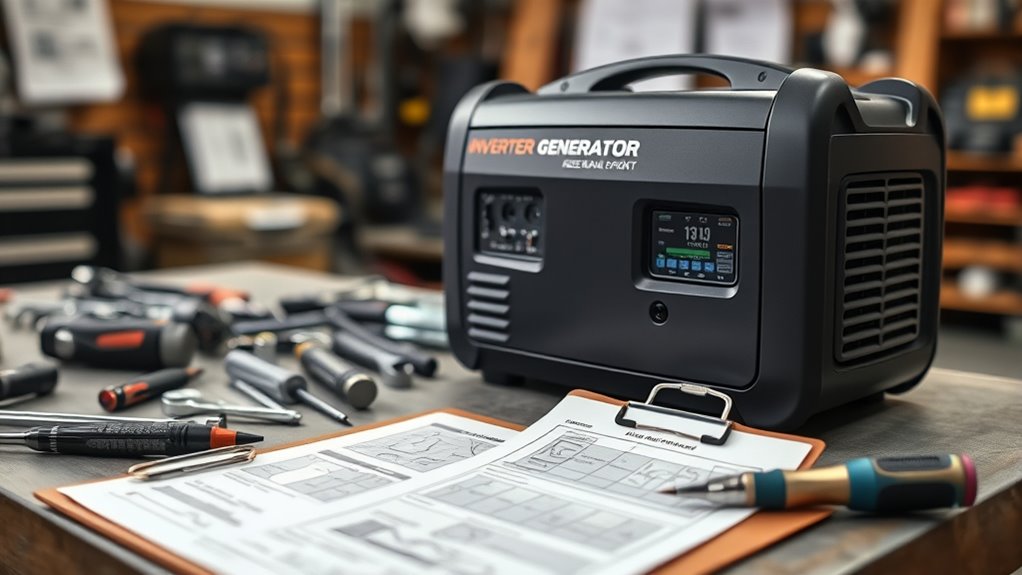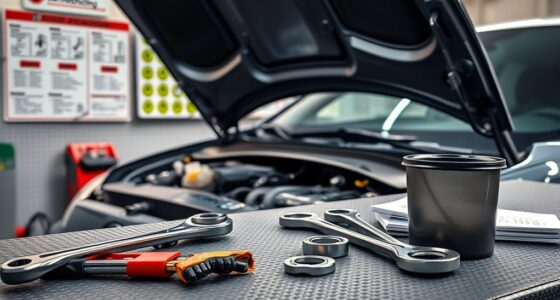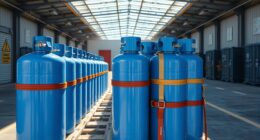To keep your inverter generator running smoothly, follow a regular maintenance schedule including inspecting and replacing the air filter, checking and topping off oil, inspecting spark plugs, and ensuring fuel lines are clean and leak-free. Properly maintain the cooling and exhaust systems as outlined in your user manual. Staying consistent with these tasks helps prevent breakdowns and noise issues. Keep working through these steps, and you’ll discover important tips to maximize your generator’s performance and lifespan.
Key Takeaways
- Follow the manufacturer’s maintenance schedule for routine inspections, oil changes, and filter replacements.
- Regularly inspect and clean or replace the air filter to ensure optimal engine breathing.
- Check and maintain proper fuel quality, flow, and line integrity to prevent engine misfires and noise.
- Inspect and replace spark plugs based on wear and fouling to improve performance and reduce noise.
- Keep cooling and exhaust systems in check to ensure efficient operation and minimize noise levels.
Essential Routine Maintenance Tips

Regular maintenance is crucial to keep your inverter generator running smoothly and reliably. When you stay on top of routine care, you not only guarantee consistent performance but also improve fuel efficiency and noise reduction. A well-maintained generator uses fuel more effectively, saving you money in the long run, and operates more quietly, making it less disruptive during use. By following a regular maintenance schedule, you can prevent common issues that might otherwise reduce your generator’s lifespan and efficiency.
Start by inspecting the air filter regularly. A clean air filter allows your generator to breathe properly, which directly impacts fuel efficiency. When the filter gets clogged with dirt or debris, your engine has to work harder, wasting fuel and increasing noise levels. Remove the filter periodically and clean or replace it as needed. This simple step keeps your generator running smoothly while minimizing the noise it produces. Checking the oil level is equally important; low or dirty oil can cause engine strain and reduce performance. Regularly top off or change the oil according to your manufacturer’s recommendations to maintain ideal operation. Fresh oil ensures your engine runs efficiently and quietly, reducing unnecessary noise during operation.
Inspect and clean the air filter regularly to ensure optimal fuel efficiency and quiet operation.
Fuel system maintenance is also critical. Use fresh fuel and consider adding fuel stabilizer if you won’t use the generator for an extended period. A clean fuel system prevents clogs and ensures smooth fuel flow, which enhances fuel efficiency and keeps noise levels down by preventing engine misfires or rough running. Periodically inspect the fuel lines for leaks or cracks, replacing any damaged parts promptly. This prevents leaks that could cause hazardous fumes and performance dips, maintaining both your safety and your generator’s efficiency.
Another crucial aspect is inspecting and cleaning the spark plug. A fouled or worn spark plug can cause misfires, reducing fuel efficiency and increasing noise as the engine struggles to run smoothly. Remove the spark plug, clean or replace it if necessary, and check the gap according to the manufacturer’s specifications. Doing this regularly helps your inverter generator run more efficiently and quietly, extending its lifespan.
In addition, it’s beneficial to understand the importance of self-watering plant pots in gardening maintenance. Proper watering techniques can prevent overwatering or underwatering, which can stress plants and reduce their lifespan.
Finally, always follow the recommended maintenance schedule outlined in your user manual. This includes checking the battery, cooling system, and exhaust components. Proper cooling and exhaust management keep your generator running at ideal temperature, which not only enhances fuel efficiency but also minimizes noise. Staying diligent with these maintenance tasks ensures your inverter generator performs reliably, uses fuel efficiently, and operates quietly—making your investment well worth it over time.
Frequently Asked Questions
How Often Should I Replace the Inverter’s Internal Filters?
You should replace your inverter’s internal filters every 200 to 300 hours of operation or at least once a year, whichever comes first. Regular filter replacement is vital for proper maintenance intervals, preventing dust and debris buildup that can affect performance. Check your owner’s manual for specific recommendations, but don’t wait too long—timely filter replacement keeps your inverter running smoothly and prolongs its lifespan.
Can I Upgrade My Inverter Generator’s Software or Firmware?
Absolutely, you can upgrade your inverter generator’s software and firmware—think of it as giving your machine a superhero boost! Manufacturers often release software updates and firmware upgrades that can enhance performance, fix bugs, and add new features. Just check your model’s instructions, download the latest updates from the official site, and follow the easy steps. Upgrading keeps your generator running at peak power—like giving it a turbocharged shot of energy!
What Are Signs of Inverter Circuit Board Failure?
If your inverter generator’s circuit board is failing, you’ll notice failure symptoms like inconsistent power output, frequent shutdowns, or error codes. During circuit diagnostics, check for signs such as burning smells, visible damage, or blown fuses. These failure symptoms indicate possible circuit board issues. Address these promptly by inspecting the board carefully, and consider professional repair or replacement to prevent further damage and ensure safe operation.
Is It Safe to Run the Generator Without a Load?
Running your generator without a load isn’t ideal, as it can impact generator safety and cause unnecessary wear. While it might seem harmless, operating without load can lead to voltage fluctuations and potential damage over time. Proper load management guarantees consistent performance and longevity. To keep your generator running smoothly, always follow manufacturer guidelines and avoid running it empty. This way, you maintain safe operation and protect your investment.
How Do Environmental Conditions Affect Maintenance Schedules?
Environmental conditions like weather impact your maintenance schedule, especially in extreme heat or cold, which can strain your generator. Humidity may cause corrosion, so check for rust and moisture regularly. If you’re at high altitude, you’ll need to perform altitude adjustments to keep your generator running efficiently. Regularly inspecting and adjusting for these conditions ensures your inverter generator stays reliable and performs at its best in varying environmental settings.
Conclusion
Keeping up with your inverter generator’s maintenance isn’t just about longevity—it can boost efficiency by up to 20%. Regular checks and troubleshooting save you time and money in the long run, preventing unexpected breakdowns. Remember, a well-maintained generator provides reliable power whenever you need it most. So stay consistent with your schedule, follow this playbook, and enjoy peace of mind knowing your inverter generator is always ready to perform.









